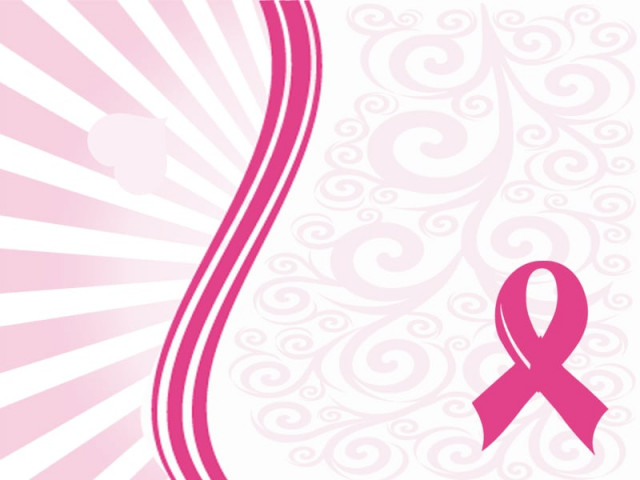Breast cancer - awareness and diagnosis
While breast cancer is rare in young women, it can and does affect them.

We expect our bodies to be energetic and resilient. If we allow ourselves to worry about breast cancer, it is usually on behalf of our mums, aunts or grandmothers.
As for us, breast cancer seems to be something we can think about when we are older. That’s why awareness seminars and pink ribbon pieces in newspapers and online are not really “talking to me”.
Well, not exactly. While breast cancer is rare in young women, it can and does affect them. In Pakistan, the prevalence of breast cancer — estimated at 38.5 per cent - is the highest amongst all the cancers. Moreover, breast cancer kills 40,000 Pakistani women annually.
I bet you’ve seen these statistics before and probably even know someone who has breast cancer. Still the subject is shrouded in mystery.
Let’s try and simplify it. Billions of tiny cells make up your body, dividing and growing throughout your life and replacing cells that wear out or are injured. When cells divide normally, they follow the genetic instructions on their genes.
But sometimes this natural process breaks down and the cells begin to grow out of control. When a gene is damaged, we call it a ‘mutation’. When mutations occur in certain genes, cells don’t die when they should and new cells form when we don’t need them.
On the cellular level, the equivalent is a cancer tumour – a group of your own cells that have divided out of control. Breast cancer occurs when uncontrolled cell growth creates a tumour in the breast.
The best way to prevent breast cancer – or to find it before it becomes life threatening – is to start paying attention right now. Your busy life is guided by a carefully juggled list of priorities; something has to be pretty important to make it onto that list.
Breast cancer is that important.
Adopt a proactive attitude toward your health, and breast cancer in particular, because in your 20s and 30s, you’re developing lifelong behaviours which will pay dividends the rest of your life. It’s the perfect time in our lives to get to know what’s normal in our bodies, so we’ll quickly and easily be able to detect anything strange or abnormal later on.
So from now on, commit to: regular breast monitoring, a low-fat diet, maintaining a healthy weight, limiting or eliminating alcohol consumption and exercising regularly.
One of the best ways to prevent breast cancer is to keep a check on the carbs and proteins you are taking in your daily routine. Cut back on your fat intake and make exercise a part of your daily life. Regular exercise for 30 minutes or more on most days can reduce your risk of developing breast cancer. Plus, it has lots of other benefits like lowering your risk for heart disease and reducing stress.
A recent study shows that Omega 3 oils (found in fish) lowers the occurrence of breast cancer by slowing down the growth of cancerous tumours and boosting the immune system. Research has shown that certain foods can actually help decrease your risk of developing cancer.
Not only are these cancer-fighting foods nutritious, they are usually inexpensive and a natural way to take action and manage your health. These include vitamin A, vitamin E, vitamin D, fibre, fruits and vegetables
Breastfeeding for one to two years has been proven to reduce your estrogen levels, which may lower your risk of developing breast cancer (this is especially true if you have a family history of the disease). Breastfeeding also offers many health benefits to babies and may reduce a female baby’s overall risk of developing breast cancer later in life.
Remember that stress is always detrimental to physical and mental health. A British survey in 1995 concluded that women who reported severe stress in the previous five years were 50 per cent more likely to have breast cancer. Although doctors are still not 100% sure about the findings of this survey, they still urge their patients and people in general to cut out stressors from their life.
Monitoring your breast health does not necessarily mean you are looking for cancer, as it’s very unlikely you’ll develop it as a young woman. It simply means taking control of your long-term health!
How to: Breast self-exam
Monitoring your breasts over time is one of the best ways to detect any problems, should they arise. Be sure to speak up and contact your doctor if you notice any changes. Stay abreast and aware of your health. You can examine the health of your breasts at home in these five easy steps
Step 1: Examine yourself in the mirror and look for puckering or bulging of the skin and/or redness or swelling around the chest area.
Step 2: Raise your arms and look for the same changes.
Step 3: Look for any signs of watery, milky, or yellow fluid or blood coming out of your nipples.
Step 4: Check the lower half of your breasts for lumps or humps by gently pressing your finger tips on the area.
Step 5: Cover the entire area using the same hand movements described in Step 4.
(With additional information from breastcancer.org)
Sidra Iqbal is a media broadcaster and development activist. She can be reached at iqbal.sidra@gmail.com and Twitter: @sidraiqbal
Published in The Express Tribune, Ms T, October 21st, 2012.
Like MsT on Facebook and follow at @TribmagMsT for your dose of girl talk



















COMMENTS
Comments are moderated and generally will be posted if they are on-topic and not abusive.
For more information, please see our Comments FAQ